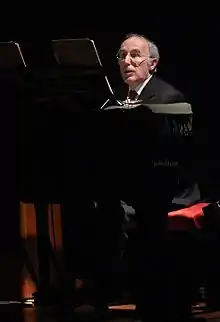Bruno Canino
Bruno Canino (born 30 December 1935) is an Italian classical pianist, harpsichordist and composer.[1]

Early life
Bruno Canino was born in Naples, Italy in 1935, where he studied piano with Vincenzo Vitale. He continued his musical education in Milan, studying both piano and composition. His teachers included Enzo Calace and Bruno Bettinelli. In 1956 and again in 1958 he won prizes at the Ferruccio Busoni International Piano Competition and in 1960 at the Darmstadt competition.[2]
Career
Canino has an international reputation as a soloist, chamber musician and accompanist. Among those with whom he has appeared are the violinists Itzhak Perlman, Salvatore Accardo, Franco Mezzena, Viktoria Mullova, Pierre Amoyal, Oleksandr Semchuk, Uto Ughi, Ksenia Milas, Alessio Bidoli the flutist Severino Gazzelloni, the cellist Lynn Harrell and vocalist Cathy Berberian. He is also the pianist of the celebrated Trio di Milano, together with the violinist Mariana Sîrbu and cellist Rocco Filippini.
He is an enthusiastic advocate of contemporary music. Among the composers who have dedicated works to him are including Luciano Berio, Mauricio Kagel, Wolfgang Rihm and Iannis Xenakis. He has also composed a number of solo and chamber works for piano.[2]
From 1999 to 2001 he was music director of the Biennale di Venezia and from 1986 to 1995 artistic director of Giovine Orchestra Genovese.
Recordings
Among Canino's notable recordings are the Bach Goldberg Variations, the complete piano works of Alfredo Casella and the first recording on compact disc of the complete piano works of Debussy. His duo recital with Viktoria Mullova of works by Prokofiev, Ravel, and Stravinsky was awarded the Edison Prize. In 1980, he recorded piano rarities by Rossini and Donizetti on a Bösendorfer Imperial Grand for the Japanese Camerata label.
See also
External links
References
- Adelson, Robert. "Biography: Bruno Canino". Allmusic. Retrieved 2 May 2010.
- Gill, Dominic. "Canino, Bruno". Grove Music Online. Oxford Music Online. Oxford University Press. Retrieved 11 October 2014.
| Wikimedia Commons has media related to Bruno Canino. |
